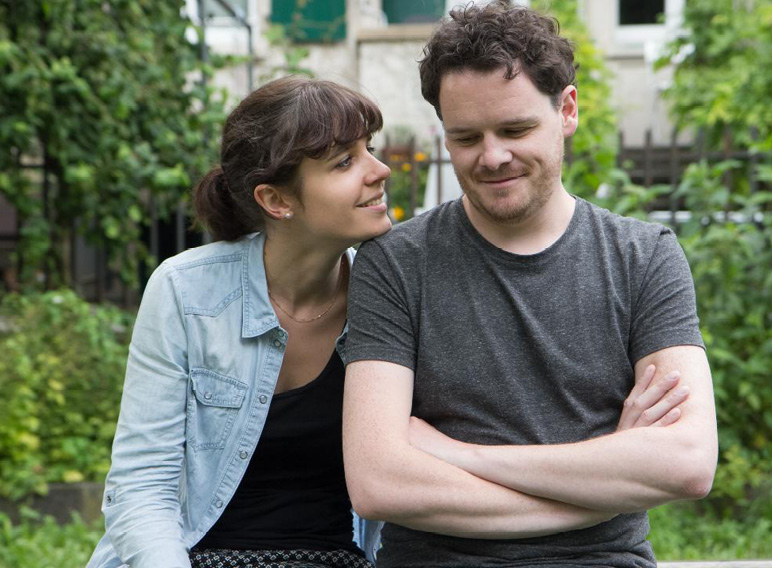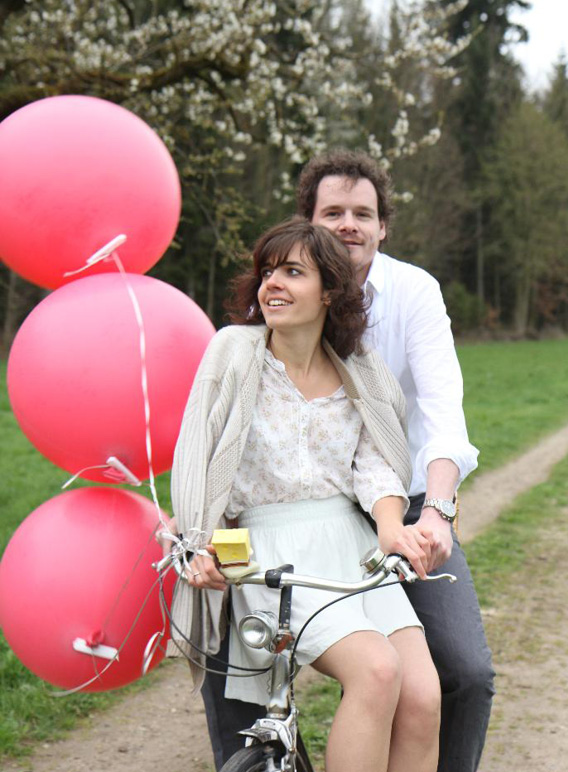
Markus Hänni has cystic fibrosis, is married and is the father of two children. His chronic illness naturally has an impact on his life. And not just his life, also and especially, that of his wife, with whom he lives. How big is this impact and what is it like for a chronically ill person to be in a healthy relationship?
Markus Hänni: I think the most important and nicest thing is that we do things as a couple with much more intention because we also experience times when things aren’t going so well for me. So we are that much more happy when we can do and experience things together. This conscious enjoyment in the now is surely the most important factor. The flip side is the limitations that go hand in hand with the many daily treatments and having to take medications. Other couples are have more freedom and are more spontaneous than we are in terms of daily routine, but planning travel and excursions. Because of my cystic fibrosis I have to do inhalation therapy for an hour in the morning and in the evening, and I take a lot of medications. I have a lot of doctor’s appointments and unfortunately with my disease hospitalisations are a normal occurrence. All of this has to be factored in when making short-term and long-term plans. Before every trip we worry that our plans could be upended because I have to go to the hospital for pneumonia. But we try to make the best of it and be limited by it as little as possible.

Markus Hänni:Nine years ago, at the start of our relationship, there were conflicts. The reason was that my wife had expectations that I could not fulfil. She had these expectations because I did not talk not openly and honestly about my disease or my abilities. My wife has a ton of energy. Whereas I do not, because of the cystic fibrosis. Initially I did not communicate this very clearly or directly, and just expected that she could imagine this. But young, healthy people can’t understand that one can suddenly get very tired and need a break. That is something one expects of the elderly, not of a man in his thirties. In addition, at the beginning of our relationship my wife wanted me to be finished with my inhalation therapy by the time she got up in the morning. Over the long term though this request meant that I, a sick person, was regularly getting one-and-a-half to two hours less sleep a night than she, a healthy person, was. But as a rule I tend to need more sleep and rest because of my disease. Now she no longer wants me to do this. Quite the opposite. She helps me by making breakfast alone so I can sleep longer and do my inhalation therapy.
Markus Hänni: Our society is dominated by focus on performance. This basic attitude runs very deep. It is hard to let go of it, for me and my wife too. Which means it is a potential source of conflict. I can’t do as much as my wife because of my disease. We both had to learn how to cope with this. I have often felt bad and attacked when I couldn’t do as much as my wife. I had to learn for myself that I am worthy of love even if I can’t do as much. My wife had to learn to accept that I do not mean it personally nor am I being a killjoy when I need to rest and have to withdraw. This has evened out now. I don’t force her to come back home with me when we are out of the house when I need a break and or need to do my treatment, nor do I ask her to stop doing certain activities because I am not able to do them. I don’t want to stand in her way. In exchange, she is not upset when I have to withdraw and leave her alone at an event, for example, because I need to rest. My limited capabilities also has an effect in practice. I cannot pursue regular work, my wife shoulders more of the burden within the family and takes on more tasks. I have no learned to deal with the fact that I cannot do what this performance-oriented society expects of men. However, along with all the negative aspects, there are also some advantages. I spend a lot of time with my children and invest more in them. I get involved in the culture and try to help other people with chronic illnesses through my experiences, for example by writing books about cystic fibrosis.
Markus Hänni: : For us, the unstable course of my disease. My health often deteriorates quite suddenly. 2018 in particular was tough and very challenging. I was hospitalised for 16 weeks. There was a question of whether I needed a lung transplant. Transplantation surgery can of course also sometimes end badly. Prospects like these are worrying and distressing. These types of situations can only be overcome with optimism and mental toughness, which Barbara, and I also, both have. Fortunately, I recovered and did not have to get a transplant.
Markus Hänni: I think because of me my wife has a greater awareness that health is precious and that one should be thankful for what one has. We enjoy each moment more. With me, she has a husband who is devoted to her. I want nothing more than for her to be happy. Before we became a couple, I said to her, “It is more important that you are happy than for me to get my wish to be in a relationship with you.” Even when the idea that should might choose to be with another man was naturally painful. I am always very grateful for our relationship. But this does not necessarily have anything to do with my illness, rather it is just an extremely fortunate thing to have someone at your side with whom you are stronger and better together. I show Barbara this by giving her time, love, my energy, and by listening. So I can’t buy her a Porsche... (laughs). Of course healthy men can also offer the things I listed. But when someone is at work from morning to night, then maybe it isn’t as easy to do.
Note: The statements made in the interview are the individual views of the interviewee. They do not necessarily reflect the PARI view or the general state of science.
An article written by the PARI BLOG editorial team.
© 2025 PARI GmbH Spezialisten für effektive Inhalation